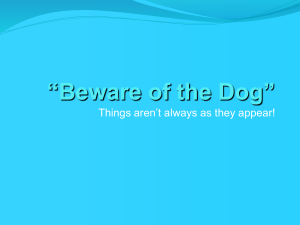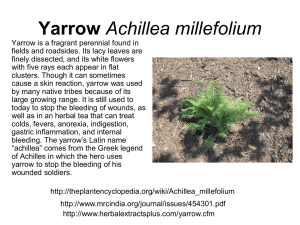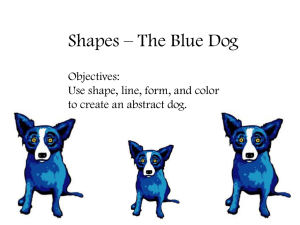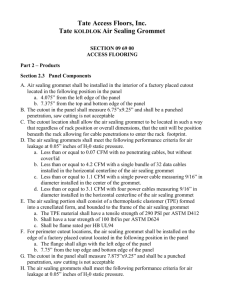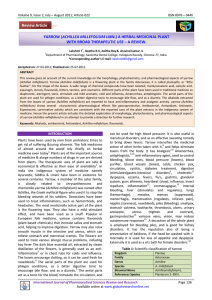Veterinary-Conference-12-July-2013
advertisement
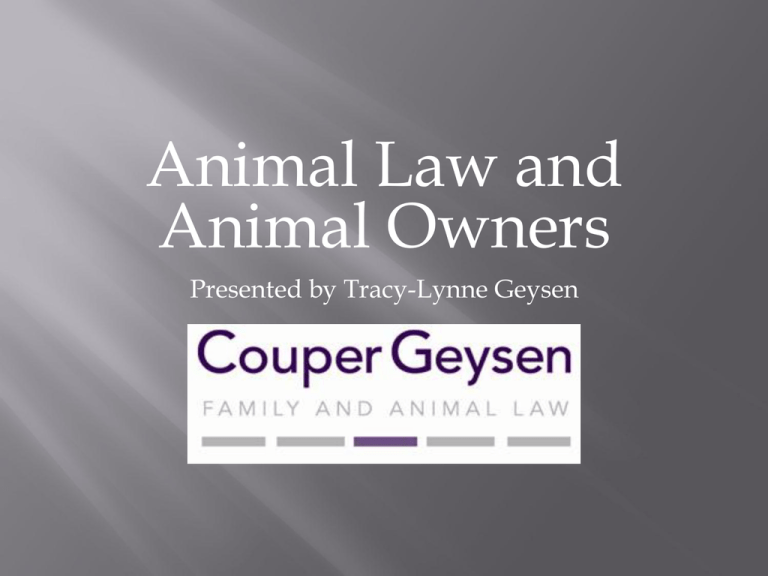
Animal Law and Animal Owners Presented by Tracy-Lynne Geysen Australia has one of the highest incidences of pet ownership in the world – 33 million pets live in approximately 8 million households. A 2006 survey revealed – 85% of pet owners agreed their pet is part of the family, like a child; 57% of pet owners agreed their pet was their best friend; 38% of pet owners let their pet sleep in their bed; 21% celebrated their pet’s birthdays. It was stated by Former President of the Australian Law Reform Commission, Professor David Wiesbrot AM, that animal protection may be ‘the next generation social justice movement’. 25 years ago environmental law as an area of law was scoffed at. Potentially very wide scope, but some of the key issues include: Why and how do animals matter? obligations owed to animals; animal welfare, animal interests and animal rights. What is an ‘animal’ in law? detailed definition in Animal Care and Protection Act 2001 (Qld) s 11 (but differs from jurisdiction to jurisdiction). Legal status of animals animals as personal property. Farmed animals cruelty and welfare, including in factory farming and live export. Animals used in research role of Animal Ethics Committees, accountability. Wild animals protection, farming and killing of native species killing of so-called ’feral’ or ‘pest’ animals intersection with environmental law. In a university setting two main ways in which ‘animal law’ is taught/understood: ‘black letter’ courses, surveying established doctrinal categories (eg property, contract, torts, administrative law, succession etc) and identifying legislation and cases which in some way concern animals. law-in-context courses, which take a critical approach to the way in which animal interests are addressed in law. Animal law, especially a ‘law-in-context’ approach, draws on non-legal disciplinary knowledge including: animal welfare science (scientific evidence of animal behaviour/sentiency); ethics; politics/political theory; and sociology. In the United States: First taught in 1986 in one law school, now taught in approx 75 law schools. Center for Animal Law Studies (Lewis & Clark Law School, Portland, Oregon) – offers a suite of courses in animal law. Number of law journals established: Journal of Animal Law and Ethics; Animal Law Review; Journal of Animal Law; Stanford Journal of Animal Law and Policy; and Journal of Animal and Environmental Law. In Australia: First offered by UNSW in 2005. Nine law schools offer or have offered animal law: ANU, Bond, Flinders, Griffith, Melbourne, Southern Cross, Sydney, UNSW, Wollongong. Australian Animal Protection Law Journal established in 2008. Animal Law in Australasia (Fed Press) published in 2009; Animal Law in Australia and New Zealand (Thomson). Animal law as a practice area: TLG Lawyers (now Couper Geysen – Family and Animal Law) – first private practice in Australia to specialise in animal law; Barristers Animal Welfare Panels (Vic and NSW); Animal Welfare Community Legal Centre (Tas); Pro Bono Animal Law Service (PILCH in NSW and Vic); In practice animal law is – 1. 2. 2. 4. 5. 6. 7. 8. Taking action where animals have been harmed and abused; Defending animal activists; Wrongful death; Pet ‘custody’ cases’; Dangerous dog cases; Estate planning for pets; Body corporate disputes; Vet negligence. Some examples – The wife retained the home, and the bull terrier; The husband argued he should retain the dog; The court said the dog was a gift from the husband to the wife. Some examples – A couple spent 2 years and $150,000 in legal fees contesting the post-separation placement of their dog Gigi They wife produced photographs and evidence from an animal behaviouralist to show the court her lifestyle was more suitable to care for Gigi and she had always been Gigi’s primary carer. Dangerous dog declaration overturned Maxine the German Shepherd Negligence by trainer BELINDA the toy poodle BRISBANE COUPLE SUE AFTER THEIR PET DIES IN A BOARDING PET MOTEL AT BRACKEN RIDGE RENEE VIELLARIS LEGAL AFFAIRS THE COURIER-MAIL JULY 11, 2013 Mark Allen and Elly Yarrow will sue over the death of their dog. A BRISBANE couple grieving the loss of their beloved dog Grommet will become the first in Australia to sue for pain and suffering after their maltalier was fatally mauled at a kennel. Mark Allen and Elly Yarrow have hired one of the state's big guns to try the test case, barrister Michael Byrne, QC, who also represents accused wife killer Gerard Baden-Clay. Mr Byrne has also represented former Bundaberg doctor Jayant Patel and convicted killer Max Sica. Mr Allen and Ms Yarrow, struggling to cope after the shock death of their 10-year-old dog, have asked for $25,000 in compensation from a southeast Queensland kennel. Ms Yarrow, 56, told The Courier-Mail that she didn't want her companion to die in vain and hoped a "Grommet's Law'' would change how the legal system categorised animals. "She was my daughter's but when she moved out Grommet stayed with us and moved with us (from Adelaide) to Queensland. "When we went overseas for four weeks two years ago, it was the longest time I'd been away from her. I emailed her to see how she was going.'‘ The pair said they had not recovered since Grommet was fatally attacked by a large dog on February 22. Mr Allen and Ms Yarrow dropped off Grommet at the kennel before going to Hamilton Island. Within 24 hours she was bit by another dog. She later died from her internal injuries. Mr Allen, 52, said they tried to return to Brisbane straight after hearing Grommet had been bit but could not get on a flight. When they went to a vet, Grommet was given to them frozen. It was too much for the pair, who later had Grommet cremated and her ashes taken to a favourite spot in Adelaide. The couple said they could not get a straight answer from the kennel on how the tragedy occurred. They submitted a Right to Information request to Brisbane City Council, which revealed the attacking dog was left unsupervised when Grommet was released nearby into an exercise yard. BCC later euthanised the dog and issued the kennel manager with an infringement notice over the incident. It will be the first time a plaintiff has sued for damages beyond an animal's replacement cost. Grommet, a cross between a cavalier and a Maltese terrier, was treated like a child by the two empty-nesters. Elly Yarrow and Mark Allen are proceeding with a court action for pain and suffering over the death of their dog Grommet. "She was like a family member. It's the unconditional love. We moved houses because she didn't like the old one,'' said Ms Yarrow, an occupational therapist assistant at the Royal Children's Hospital's burns unit. Mr Allen, a consulting manufacturing engineer, said they took the case to the law firm when the kennel's insurers "insulted'' them by offering the cost of a replacement dog. "We are both suffering severe grief symptoms. Elly is noticeably withdrawn (and) still cries herself to sleep.“ Mr Allen attends counselling sessions to deal with his grief and Ms Yarrow attends a weekly mediation group. Ms Yarrow said she had lost her sense of humour and purpose at work. A statement of claim will soon be filed in Brisbane Magistrates Court. Mr Byrne said he was "hopeful'' of a win. Tracey Jackson, of Couper Geysen - Family and Animal Law, said people had not previously sued because the law considered animals to be property. http://au.news.yahoo.com/todaytonight/lifestyle/article/-/17959084/kennelsued-for-pet-death/ •NZ courts have awarded parties compensation for emotional loss for their pets. •Acknowledgement that animals have feelings and the changing status of animals as property.




